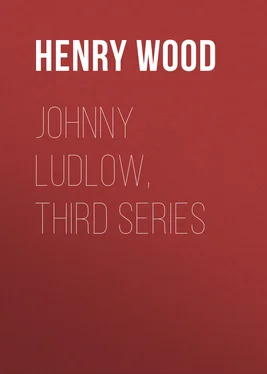Henry Wood - Johnny Ludlow, Third Series
Здесь есть возможность читать онлайн «Henry Wood - Johnny Ludlow, Third Series» — ознакомительный отрывок электронной книги совершенно бесплатно, а после прочтения отрывка купить полную версию. В некоторых случаях можно слушать аудио, скачать через торрент в формате fb2 и присутствует краткое содержание. Жанр: foreign_prose, literature_19, foreign_antique, на английском языке. Описание произведения, (предисловие) а так же отзывы посетителей доступны на портале библиотеки ЛибКат.
- Название:Johnny Ludlow, Third Series
- Автор:
- Жанр:
- Год:неизвестен
- ISBN:нет данных
- Рейтинг книги:4 / 5. Голосов: 1
-
Избранное:Добавить в избранное
- Отзывы:
-
Ваша оценка:
- 80
- 1
- 2
- 3
- 4
- 5
Johnny Ludlow, Third Series: краткое содержание, описание и аннотация
Предлагаем к чтению аннотацию, описание, краткое содержание или предисловие (зависит от того, что написал сам автор книги «Johnny Ludlow, Third Series»). Если вы не нашли необходимую информацию о книге — напишите в комментариях, мы постараемся отыскать её.
Johnny Ludlow, Third Series — читать онлайн ознакомительный отрывок
Ниже представлен текст книги, разбитый по страницам. Система сохранения места последней прочитанной страницы, позволяет с удобством читать онлайн бесплатно книгу «Johnny Ludlow, Third Series», без необходимости каждый раз заново искать на чём Вы остановились. Поставьте закладку, и сможете в любой момент перейти на страницу, на которой закончили чтение.
Интервал:
Закладка:
“The phaeton now, single horse,” he called out to Mackintosh.
“Yes, sir. Bob, or Blister?”
Tod stamped his foot in a passion. “As if it mattered! Blister; he is the more fiery of the two.”
“I must get the harness,” said Mackintosh. “It is in the yellow barn.”
Mackintosh went round on the run to gain the front barn; the harness, least used, was kept there, hung on the walls. Tod unharnessed the pony, left me to lead him to the stable, and went after the man. In his state of impatience and his strength, he could have done the work of ten men. He met Mackintosh coming out of the barn, without the harness, but with a white face. Since he saw the ghost’s light on Friday night the man had been scared at shadows.
“There’s sum’at in there, master,” said he, his teeth chattering.
“What?” roared Tod, in desperate anger.
“There is , master. It’s like a faint tapping.”
Tod dashed in, controlling his hands, lest they might take French leave and strike Luke for a coward. He was seeking the proper set of harness, when a knocking, faint and irregular, smote his ear. Tod turned to look, and thought it came from the staircase-door. He went forward and opened it.
Lying at the foot of the stairs was Hugh. Hugh! Low, and weak, and faint, there he lay, his blue eyes only half opened, and his pretty curls mingling with the dust.
“Hugh! is it you, my darling?”
Tod’s gasp was like a great cry. Hugh put up his little feeble hand, and a smile parted his lips.
“Yes, it’s me, Joe.”
The riddle is easily solved. When sent back by me, Hugh saw Hannah in the fold-yard; she was, in point of fact, looking after him. In his fear, he stole round to hide in the shrubbery, and thence got to the front of the house, and ran away down the road. Seeing the front barn-door open, for it was when Luke Mackintosh was getting the corn, Hugh slipped in and hid behind the door. Luke went out with the first lot of corn, and the senseless child, hearing Tod’s voice outside, got into the place leading to the stairs, and shut the door. Luke, talking to Tod, who had stepped inside the barn, saw the door was shut and slipped the big outside bolt, never remembering that it was not he who had shut it . Poor little Hugh, when their voices had died away, ran upstairs to get to the upper granary, and found its door fastened. And there the child was shut up beyond reach of call and hearing. The skylight in the roof, miles, as it seemed, above him, had its ventilator open. He had called and called; but his voice must have been lost amidst the space of the barn. It was too weak to disturb a rat now.
Tod took him up in his arms, tenderly as if he had been a new-born baby that he was hushing to the rest of death.
“Were you frightened, child?”
“I was till I heard the church-bells,” whispered Hugh. “I don’t know how long it was—oh, a great while—and I had ate the biscuit Johnny gave me and been asleep. I was not frightened then, Joe; I thought they’d come to me when church was over.”
I met the procession. What the dirty object might be in Tod’s arms was quite a mystery at first. Tod’s eyes were dropping tears upon it, and his breath seemed laboured. Luke brought up the rear a few yards behind, looking as if he’d never find his senses again.
“Oh, Tod! will he get over it?”
“Yes. Please God.”
“Is he injured?”
“No, no. Get out of my way, Johnny. Go to the mother now, if you like. Tell her he has only been shut up in the barn and I’m coming in with him. The dirt’s nothing: it was on him before.”
Just as meek and gentle she stood as ever, the tears rolling down her face, and a quiet joy in it. Tod brought him in, laying him across her knee as she sat on the sofa.
“There,” he said. “He’ll be all right when he has been washed and had something to eat.”
“God bless you, Joseph!” she whispered.
Tod could say no more. He bent to kiss Hugh; lifted his face, and kissed the mother. And then he went rushing out with a burst of emotion.
OUR VISIT
I
We went down from Oxford together, I and Tod and William Whitney; accompanying Miss Deveen and Helen and Anna Whitney, who had been there for a few days. Miss Deveen’s carriage was waiting at the Paddington Station; they got into it with Tod, and William and I followed in a cab with the luggage. Miss Deveen had invited us all to stay with her.
Miss Cattledon, the companion, with her tall, thin figure, her pinched-in waist and her creaking stays, stood ready to receive us when we reached the house. Miss Deveen held out her hand.
“How have you been, Jemima? Taking care of yourself, I hope?”
“Quite well, thank you, Miss Deveen; and very glad to see you at home again,” returned Cattledon. “This is my niece, Janet Carey.”
A slight, small girl, with smooth brown hair and a quiet face that looked as if it had just come out of some wasting illness, was hiding herself behind Cattledon. Miss Deveen said a few pleasant words of welcome, and took her hand. The girl looked as shy and frightened as though we had all been a pack of gorillas.
“Thank you, ma’am; you are very kind,” she said in a tremble; and her voice, I noticed, was low and pleasant. I like nice voices, whether in man or woman.
“It wants but half-an-hour to dinner-time,” said Miss Deveen, untying the strings of her bonnet. “Miss Cattledon, will you show these young friends of ours the rooms you have appropriated to them.”
My room and Tod’s—two beds in it—was on the second floor; Helen and Anna had the best company room below, near Miss Deveen’s; Bill had a little one lower still, half-way up the first flight of stairs. Miss Cattledon’s room, we found out, was next to ours, and her niece slept with her.
Tod threw himself full length on his counterpane—tired out, he said. Certain matters had not gone very smoothly for him at Oxford, and the smart remained.
“You’ll be late, Tod,” I said when I was ready.
“Plenty of time, Johnny. I don’t suppose I shall keep dinner waiting.”
Miss Deveen stood at the door of the blue room when I went down: that pretty sitting-room, exclusively hers, that I remembered so well. She had on a purple silk gown, with studs of pale yellow topaz in its white lace front, studs every whit as beautiful as the emeralds made free with by Sophie Chalk.
“Come in here, Johnny.”
She was beginning to talk to me as we stood by the fire, when some one was heard to enter the inner room; Miss Deveen’s bed-chamber, which opened from this room as well as from the landing. She crossed over into it, and I heard Cattledon’s voice.
“It is so very kind of you, Miss Deveen, to have allowed me to bring my niece here! Under the circumstances—with such a cloud upon her–”
“She is quite welcome,” interrupted Miss Deveen’s voice.
“Yes, I know that; I know it: and I could not go down without thanking you. I have told Lettice to take some tea up to her while we dine. She can come to the drawing-room afterwards if you have no objection.”
“Why can’t she dine with us?” asked Miss Deveen.
“Better not,” said Cattledon. “She does not expect it; and with so many at table–”
“Nonsense!” came Miss Deveen’s quick, decisive interruption. “Many at table! There are sufficient servants to wait on us, and I suppose you have sufficient dinner. Go and bring her down.”
Miss Deveen came back, holding out her hand to me as she crossed the room. The gong sounded as we went down to the drawing-room. They all came crowding in, Tod last; and we went in to dinner.
Miss Deveen, with her fresh, handsome face and her snow-white hair, took the head of the table. Cattledon, at the foot, a green velvet ribbon round her genteel throat, helped the soup. William Whitney sat on Miss Deveen’s right, I on her left. Janet Carey sat next to him—and this brought her nearly opposite me.
Читать дальшеИнтервал:
Закладка:
Похожие книги на «Johnny Ludlow, Third Series»
Представляем Вашему вниманию похожие книги на «Johnny Ludlow, Third Series» списком для выбора. Мы отобрали схожую по названию и смыслу литературу в надежде предоставить читателям больше вариантов отыскать новые, интересные, ещё непрочитанные произведения.
Обсуждение, отзывы о книге «Johnny Ludlow, Third Series» и просто собственные мнения читателей. Оставьте ваши комментарии, напишите, что Вы думаете о произведении, его смысле или главных героях. Укажите что конкретно понравилось, а что нет, и почему Вы так считаете.












